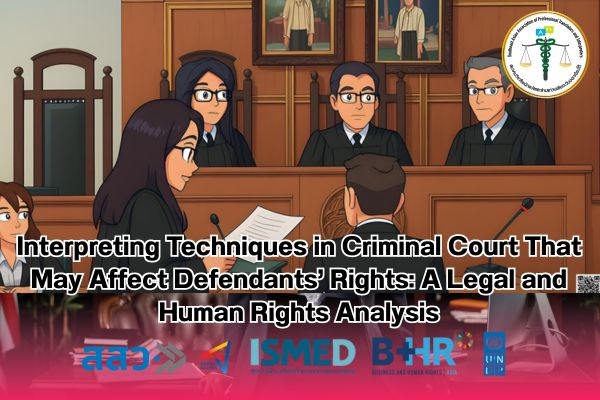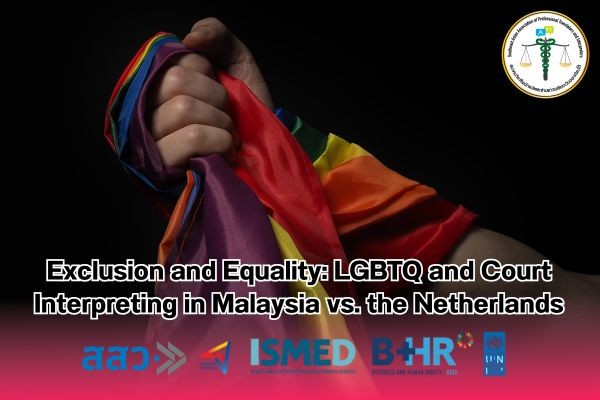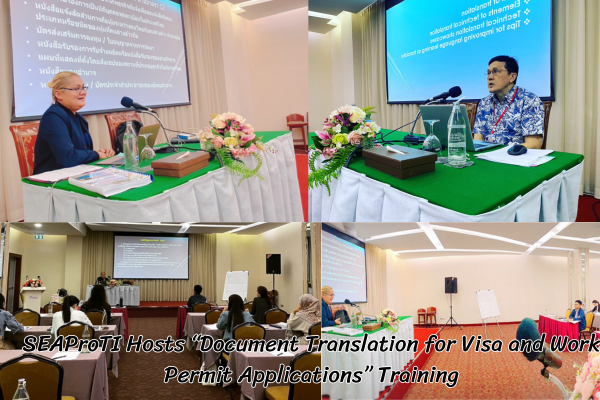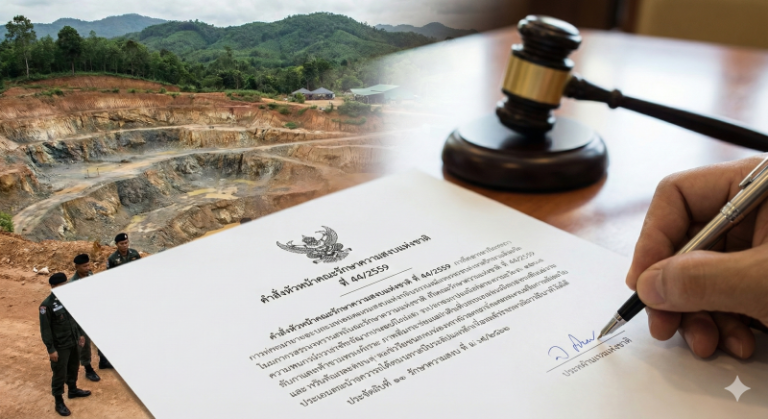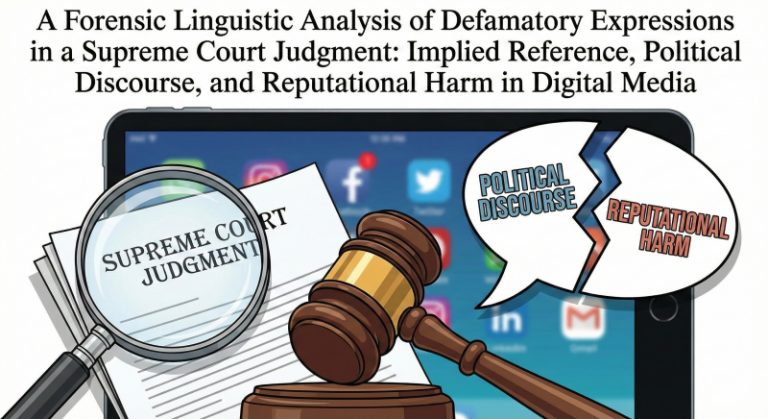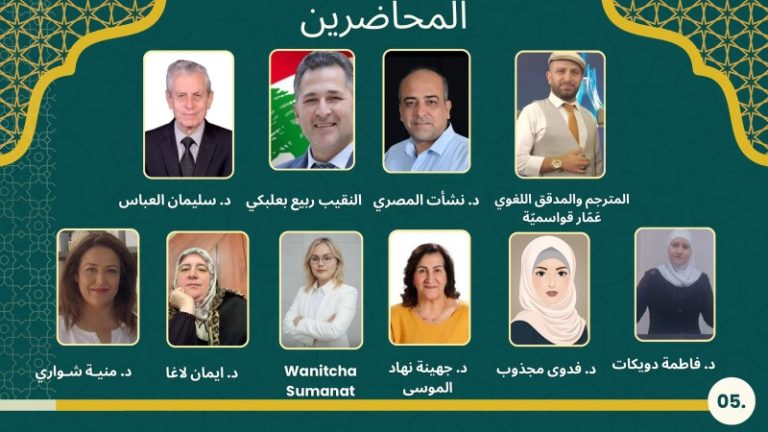Interpreting Techniques in Criminal Court That May Affect Defendants’ Rights: A Legal and Human Rights Analysis
Author: Wanitcha Sumanat, president of the Southeast Asian Association of Professional Translators and Interpreters
18 September 2025, Bangkok – Language interpretation in judicial proceedings plays a crucial role in safeguarding defendants’ rights, particularly in criminal cases where the accused does not understand the language used in court. Article 14(3)(f) of the International Covenant on Civil and Political Rights (ICCPR) guarantees that defendants are entitled to “free assistance of an interpreter” to ensure a fair trial (United Nations, 1966). This article analyzes interpreting techniques in criminal courts that may adversely impact the right to a fair trial and examines the relevant Thai legal framework, professional standards, and recommendations for improvement.
Defendants’ Rights under International Law
ICCPR Article 14(3)(f) establishes a fundamental right for defendants who do not understand the language of the court to receive free interpretation, covering both oral interpretation during hearings and translation of essential documents such as indictments, judgments, and court orders (Nowak, 2005). This principle is part of the “fair trial” guarantee, which is binding upon Thailand as a State Party (Office of the High Commissioner for Human Rights [OHCHR], 2012).
Thai Law and Practice
Section 13 of the Thai Criminal Procedure Code requires that Thai be used as the official language in investigations and proceedings. Where a party or witness does not understand Thai, the court must promptly provide an interpreter, covering all stages from investigation through trial (Criminal Procedure Code, 2022). Furthermore, the Court of Justice has adopted a Code of Ethics for Court Interpreters emphasizing honesty, impartiality, and completeness of interpretation (Court of Justice, 2021).
Risks from Inadequate Interpreting Techniques
Although Thai law provides for free interpretation, quality issues are frequently reported. During an observation on 10 September 2025 at the Bangkok South Criminal Court, significant problems were noted: incomplete interpretation, selective omission, use of incorrect legal terminology, summarization instead of verbatim interpretation, and insertion of personal opinions. These errors distorted witness testimony and could compromise the defendant’s ability to fully understand the proceedings (Southeast Asian Association of Professional Translators and Interpreters, 2025).
Such inaccuracies may mislead defendants regarding the charges, their rights, or the content of testimony, directly affecting their right to mount an effective defense (Berk-Seligson, 2009).
Safeguards and Remedies
Defense attorneys may request the court to provide an interpreter if one is not present or if the interpreter’s quality is inadequate. They may also object to inaccurate interpretation during witness examination, prompting the court to review or replace the interpreter. Allowing parties to challenge interpreting quality aligns with the principle of checks and balances in judicial proceedings (Mikkelson, 2017).
Comparative Perspectives
Countries with strong interpreter accreditation systems, such as the United States and Australia, require court interpreters to pass rigorous certification exams and adhere to professional codes of conduct (Hale, 2011). These models illustrate the importance of standardized qualification frameworks to protect the right to a fair trial.
Conclusion
The quality of court interpreting is a decisive factor in ensuring fairness in criminal trials. Implementing strict quality standards, mandatory continuous training, and transparent mechanisms for monitoring interpreter performance are crucial measures for Thailand to fulfill its obligations under the ICCPR and guarantee genuine access to justice.
References
- Berk-Seligson, S. (2009). Court interpreting and the judicial process. Multilingual Matters.
- Hale, S. (2011). Interpreter policies, practices and protocols in Australian courts and tribunals: A national survey. Australasian Institute of Judicial Administration.
- Mikkelson, H. (2017). Introduction to court interpreting. Routledge.
- Nowak, M. (2005). UN Covenant on Civil and Political Rights: CCPR commentary (2nd ed.). N.P. Engel.
- Office of the High Commissioner for Human Rights. (2012). Human rights committee general comment No. 32: Article 14 – Right to equality before courts and tribunals and to a fair trial. United Nations.
- Criminal Procedure Code B.E. 2477 (as amended up to No. 31).
- Court of Justice. (2021). Code of Ethics for Court Interpreters.
- Southeast Asian Association of Professional Translators and Interpreters. (2025). Observation report, Bangkok South Criminal Court, 10 September 2025.
- Pentisarn, J. (n.d.). The challenges in access to the judicial process of people who cannot communicate with Thai language, focusing on providing interpreter services to them in the criminal case in Maehongson Provincial Court experience. Maehongson Provincial Court.
The Southeast Asian Association of Professional Translators and Interpreters (SEAProTI) has officially announced the qualifications and criteria for registration of Certified Translators, Translation Certification Providers, and Certified Interpreters under Sections 9 and 10 of its Charter, published in the Royal Gazette of the Secretariat of the Cabinet, Office of the Prime Minister of the Kingdom of Thailand, on July 25, 2024, Vol. 141, Part 66 Ng, p. 100. Full text available at: Certified Translators, Translation Certification Providers, and Certified Interpreters
* The Office of the Council of State has proposed that a Royal Decree be enacted to authorize registered translators—including those certified by professional associations or accredited language institutes—to legally certify translations (Letter to SEAProTI dated April 28, 2025)
* SEAProTI is the first professional association in Thailand and Southeast Asia to establish a system for certifying Certified Translators, Translation Certification Providers, and Certified Interpreters.
Head Office: Baan Ratchakhru Building, No. 33, Room 402, Soi Phaholyothin 5, Phaholyothin Road, Phaya Thai Subdistrict, Phaya Thai District, Bangkok 10400, Thailand
Email: hello@seaproti.com Telephone: (+66) 2-114-3128 (Office hours: Monday–Friday, 9:00 AM – 5:00 PM)
เทคนิคการทำงานของล่ามศาลที่อาจกระทบสิทธิของผู้ต้องหาในคดีอาญา: การวิเคราะห์เชิงกฎหมายและสิทธิมนุษยชน
ผู้แต่ง วณิชชา สุมานัส นายกสมาคมวิชาชีพนักแปลและล่ามแห่งเอเชียตะวันออกเฉียงใต้
15 กันยายน 2568, กรุงเทพมหานคร – การตีความและการแปลภาษาในกระบวนการยุติธรรมมีบทบาทสำคัญต่อสิทธิของผู้ต้องหา โดยเฉพาะอย่างยิ่งในคดีอาญาที่ผู้ต้องหาไม่เข้าใจภาษาที่ใช้ในศาล หลักการตามกติการะหว่างประเทศว่าด้วยสิทธิพลเมืองและสิทธิทางการเมือง (International Covenant on Civil and Political Rights: ICCPR) มาตรา 14(3)(f) กำหนดให้ผู้ถูกกล่าวหามีสิทธิได้รับความช่วยเหลือจากล่ามโดยไม่คิดมูลค่า เพื่อให้การพิจารณาคดีเป็นธรรม (United Nations, 1966) บทความนี้มุ่งวิเคราะห์เทคนิคการทำงานของล่ามศาลและผลกระทบที่อาจเกิดขึ้นต่อสิทธิในการต่อสู้คดีของผู้ต้องหา รวมทั้งมาตรการทางกฎหมายและแนวทางปฏิบัติที่ควรนำมาประยุกต์ใช้ในบริบทประเทศไทย
สิทธิของผู้ต้องหาตามกฎหมายระหว่างประเทศ
ICCPR มาตรา 14(3)(f) เป็นหลักประกันสิทธิขั้นพื้นฐานของผู้ต้องหาที่ไม่เข้าใจภาษาศาล ให้ได้รับล่ามฟรีทั้งการล่ามปากเปล่าในระหว่างการพิจารณา และการแปลเอกสารสำคัญ เช่น คำฟ้อง คำพิพากษา และคำสั่งศาล (Nowak, 2005) หลักการนี้เป็นส่วนหนึ่งของแนวคิด “การพิจารณาคดีอย่างเป็นธรรม” (fair trial) ซึ่งมีผลผูกพันประเทศไทยในฐานะภาคี (Office of the High Commissioner for Human Rights [OHCHR], 2012)
กฎหมายและแนวปฏิบัติในประเทศไทย
ประมวลกฎหมายวิธีพิจารณาความอาญา มาตรา 13 กำหนดให้ใช้ภาษาไทยเป็นหลัก และหากคู่ความหรือพยานไม่เข้าใจภาษาไทย ศาลต้องจัดหาล่ามโดยไม่ชักช้า ครอบคลุมตั้งแต่การสอบสวนจนถึงการพิจารณาคดี (ประมวลกฎหมายวิธีพิจารณาความอาญา, 2565) นอกจากนี้ สำนักงานศาลยุติธรรมได้จัดทำประมวลจริยธรรมล่ามศาล เน้นย้ำความซื่อสัตย์ ความเป็นกลาง และการแปลอย่างครบถ้วน (สำนักงานศาลยุติธรรม, 2564)
ความเสี่ยงจากเทคนิคการล่ามที่ไม่เหมาะสม
แม้ว่ากฎหมายไทยจะกำหนดสิทธิการได้รับล่ามฟรี แต่ปัญหาที่พบบ่อยคือคุณภาพของการล่าม ในการสังเกตการณ์ คดีวันที่ 10 กันยายน 2568 ณ ศาลอาญากรุงเทพใต้ พบปัญหาการแปลที่ไม่ครบถ้วน การเลือกแปลเฉพาะบางข้อความ การใช้ศัพท์ผิด การตัดทอนเนื้อหา และการแทรกความคิดเห็นส่วนตัวของล่าม ซึ่งส่งผลให้เนื้อหาของคำเบิกความบิดเบือน (สมาคมวิชาชีพนักแปลและล่ามแห่งเอเชียตะวันออกเฉียงใต้, 2568)
ความคลาดเคลื่อนดังกล่าวอาจทำให้ผู้ต้องหาเข้าใจผิดเกี่ยวกับข้อกล่าวหา สิทธิของตน หรือเนื้อหาคำเบิกความ ส่งผลกระทบต่อสิทธิในการต่อสู้คดีอย่างเป็นธรรม (Berk-Seligson, 2009)
กลไกการคุ้มครองสิทธิและแนวทางแก้ไข
จิตเมตต์ เพ็ญธิสาร ผู้พิพากษาหัวหน้าคณะชั้นต้นในศาลจังหวัดแม่ฮ่องสอน กล่าวไว้ในบทความวิชาการของท่านว่า ทนายจำเลยสามารถร้องขอให้ศาลจัดหาล่ามหากไม่มีหรือคุณภาพไม่เพียงพอ และสามารถทักท้วงการแปลระหว่างการสืบพยาน เพื่อให้ศาลพิจารณาแก้ไขหรือเปลี่ยนตัวล่าม การเปิดช่องให้คู่ความสามารถตรวจสอบคุณภาพล่ามเป็นไปตามหลักการตรวจสอบถ่วงดุลในกระบวนการยุติธรรม (Mikkelson, 2017)
บทเรียนจากต่างประเทศ
ประเทศที่มีกลไกรับรองคุณสมบัติล่ามอย่างเข้มงวด เช่น สหรัฐอเมริกาและออสเตรเลีย ใช้ระบบการสอบและการรับรองมาตรฐานวิชาชีพเพื่อยกระดับคุณภาพการล่ามศาล (Hale, 2011) แบบอย่างเหล่านี้ชี้ให้เห็นความสำคัญของการมีระบบรับรองและประเมินผลอย่างต่อเนื่อง เพื่อคุ้มครองสิทธิของผู้ต้องหาอย่างแท้จริง
สรุป
คุณภาพของการล่ามศาลเป็นปัจจัยสำคัญที่ส่งผลโดยตรงต่อความเป็นธรรมของกระบวนการพิจารณาคดีในคดีอาญา การบังคับใช้มาตรฐานคุณภาพล่าม การฝึกอบรมต่อเนื่อง และการเปิดให้ตรวจสอบคุณภาพการล่ามอย่างโปร่งใส เป็นมาตรการสำคัญที่ควรผลักดันให้เกิดขึ้นในระบบยุติธรรมไทย เพื่อให้สอดคล้องกับพันธกรณีของประเทศไทยตาม ICCPR
บรรณานุกรม (References)
- Berk-Seligson, S. (2009). Court interpreting and the judicial process. Multilingual Matters.
- Hale, S. (2011). Interpreter policies, practices and protocols in Australian courts and tribunals: A national survey. Australasian Institute of Judicial Administration.
- Mikkelson, H. (2017). Introduction to court interpreting. Routledge.
- Nowak, M. (2005). UN Covenant on Civil and Political Rights: CCPR commentary (2nd ed.). N.P. Engel.
- Office of the High Commissioner for Human Rights. (2012). Human rights committee general comment No. 32: Article 14 – Right to equality before courts and tribunals and to a fair trial. United Nations.
- ประมวลกฎหมายวิธีพิจารณาความอาญา พ.ศ. 2477 (แก้ไขเพิ่มเติมถึงฉบับที่ 31)
- สำนักงานศาลยุติธรรม. (2564). ประมวลจริยธรรมล่ามศาล.
- สมาคมวิชาชีพนักแปลและล่ามแห่งเอเชียตะวันออกเฉียงใต้. (2568). รายงานการสังเกตการณ์คดี ศาลอาญากรุงเทพใต้ วันที่ 10 กันยายน 2568.
- จิตเมตต์ เพ็ญธิสาร. (ไม่ปรากฏปี). ปัญหาการเข้าถึงกระบวนการยุติธรรมของผู้ไม่สามารถพูดหรือเข้าใจภาษาไทย: กรณีจัดหาล่ามในคดีอาญาของศาลจังหวัดแม่ฮ่องสอน. ศาลจังหวัดแม่ฮ่องสอน.
เกี่ยวกับนักแปลรับรอง ผู้รับรองการแปล และล่ามรับรองของสมาคมวิชาชีพนักแปลและล่ามแห่งเอเชียตะวันออกเฉียงใต้
* สมาคมวิชาชีพนักแปลและล่ามแห่งเอเชียตะวันออกเฉียงใต้ (SEAProTI) ได้ประกาศหลักเกณฑ์และคุณสมบัติผู้ที่ขึ้นทะเบียนเป็น “นักแปลรับรอง (Certified Translators) และผู้รับรองการแปล (Translation Certification Providers) และล่ามรับรอง (Certified Interpreters)” ของสมาคม หมวดที่ 9 และหมวดที่ 10 ในราชกิจจานุเบกษา ของสำนักเลขาธิการคณะรัฐมนตรี ในสำนักนายกรัฐมนตรี แห่งราชอาณาจักรไทย ลงวันที่ 25 ก.ค. 2567 เล่มที่ 141 ตอนที่ 66 ง หน้า 100 อ่านฉบับเต็มได้ที่: นักแปลรับรอง ผู้รับรองการแปล และล่ามรับรอง
** สำนักคณะกรรมการกฤษฎีกาเสนอให้ตราเป็นพระราชกฤษฎีกา โดยกำหนดให้นักแปลที่ขึ้นทะเบียน รวมถึงผู้รับรองการแปลจากสมาคมวิชาชีพหรือสถาบันสอนภาษาที่มีการอบรมและขึ้นทะเบียน สามารถรับรองคำแปลได้ (จดหมายถึงสมาคม SEAProTI ลงวันที่ 28 เม.ย. 2568)
*** สมาคมวิชาชีพนักแปลและล่ามแห่งเอเชียตะวันออกเฉียงใต้ เป็นสมาคมวิชาชีพแห่งแรกในประเทศไทยและภูมิภาคเอเชียตะวันออกเฉียงใต้ที่มีระบบรับรองนักแปลรับรอง ผู้รับรองการแปล และล่ามรับรอง
สำนักงานใหญ่: อาคารบ้านราชครู เลขที่ 33 ห้อง 402 ซอยพหลโยธิน 5 ถนนพหลโยธิน แขวงพญาไท เขตพญาไท กรุงเทพมหานคร 10400 ประเทศไทย
อีเมล: hello@seaproti.com โทรศัพท์: (+66) 2-114-3128 (เวลาทำการ: วันจันทร์–วันศุกร์ เวลา 09.00–17.00 น.)


